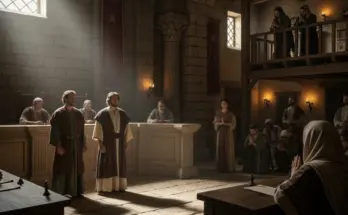Psalms Chapter 1 opens the entire book of Psalms with a clear picture of two contrasting paths. From the beginning, the psalm sets the tone for wisdom, instruction, and devotion. It teaches us that every person must choose between following God’s way or pursuing the world’s path. The psalm serves as both a guide and a warning, urging us to carefully examine our choices.
This chapter is only six verses long, yet it carries deep meaning. It tells us what it means to live a blessed life. The word “blessed” here describes happiness that comes from God, not from circumstances. The psalmist explains that true blessing is found in delighting in God’s law. When we meditate on His Word, our lives grow strong and fruitful.
Discover simple, powerful Bible study habits. Get How to Study the Bible for Yourself today!
The psalm also speaks about the wicked. They are described as unstable and without roots, like chaff blown away by the wind. Their choices eventually lead to ruin. The comparison is striking, because it shows how different the outcomes are between the righteous and the wicked.
Psalms Chapter 1 serves as a doorway into the rest of the Psalms. It introduces the central theme of walking in God’s ways. Those who follow Him will stand secure, while those who reject Him will not last. The chapter gives us a foundation for understanding the blessings of obedience and the dangers of rebellion. It invites us to reflect on which path we are walking and where it will lead.
Psalms Chapter 1: The Contrast of Two Ways (Verses 1–2)
“Blessed is the man who walks not in the counsel of the wicked, nor stands in the way of sinners, nor sits in the seat of scoffers; but his delight is in the law of the Lord, and on his law he meditates day and night.”
These verses introduce the central theme of Psalms Chapter 1 by showing two possible ways of life. The first way is the path of the wicked. The psalmist describes a downward progression: walking, standing, and sitting. It begins with listening to ungodly advice, then settling into sinful practices, and finally becoming comfortable with mockery of God’s truth. The warning is clear. When we allow sin to shape our thinking, it quickly takes hold of our actions and attitudes.
In contrast, the righteous person finds joy in God’s law. The word “delight” shows more than duty. It speaks of a deep love for Scripture. Meditating on God’s Word “day and night” points to constant reflection and application. It is not a casual glance at truth, but a lifestyle built on it.
This section reminds us that blessing comes from separation from sin and devotion to God’s Word.
The Righteous Compared to a Tree (Verse 3)
“He is like a tree planted by streams of water that yields its fruit in its season, and its leaf does not wither. In all that he does, he prospers.”
The psalmist now paints a picture of the righteous person’s life using a tree as the symbol. This imagery is rich and meaningful. A tree planted by streams has a steady supply of nourishment. It is not left to survive on rain alone. In the same way, the righteous draw strength from God’s Word and presence.
The phrase “yields its fruit in its season” describes a life that produces visible results. Fruit does not appear instantly, but in the right time it comes. The righteous may not always see immediate results, yet faithfulness brings growth and blessing.
The description “its leaf does not wither” speaks of endurance. A tree with constant water remains healthy through changing seasons. Likewise, the righteous remain steadfast through trials. The final phrase, “in all that he does, he prospers,” points to God’s favor. This does not promise worldly success but spiritual stability and usefulness.
The Way of the Wicked (Verses 4–5)
“The wicked are not so, but are like chaff that the wind drives away. Therefore the wicked will not stand in the judgment, nor sinners in the congregation of the righteous.”
The psalmist turns to describe the opposite condition. Unlike the tree firmly rooted by water, the wicked are compared to chaff. Chaff is the dry husk separated from grain during harvest. It is weightless, worthless, and easily blown away by the wind. This picture shows instability and lack of permanence.
The wicked may appear strong for a time, but their foundation is empty. They have no roots in God’s truth. Because of this, they cannot stand in the day of judgment. The phrase means more than being physically present. It refers to having no defense or righteousness before God.
The wicked are also excluded from “the congregation of the righteous.” This is both a present reality and a future truth. Even now, there is a difference between God’s people and the ungodly. In eternity, that separation will be final. This section makes clear that sin leads to instability and exclusion from God’s people.
The Final Outcome (Verse 6)
“For the Lord knows the way of the righteous, but the way of the wicked will perish.”
The psalm closes with a final contrast. The righteous and the wicked are not just different in this life, but in their ultimate destiny. The phrase “the Lord knows the way of the righteous” does not mean simple awareness. It speaks of intimate care and approval. God watches over the righteous path with protection and guidance. To be known by God is to be secure in His love.
On the other hand, “the way of the wicked will perish.” This is the end of rebellion against God. No matter how strong they seem, their path leads only to destruction. It is not just their works that fail, but the very way they walk. The word “perish” is final. It shows that life apart from God cannot endure.
This conclusion brings the entire psalm into focus. There are two ways and only two outcomes. One leads to blessing, fruitfulness, and life. The other leads to emptiness and ruin. The choice is ours.

Fill Your Home with Praise to God
Celebrate His presence daily with a beautiful wall decal that reminds you and your family to lift your voices in worship.Bring Scripture to life in your home with a wall decal that encourages constant praise and joyful reminders of His goodness. Get Yours on Amazon
Closing Thoughts on Psalms Chapter 1
Psalms Chapter 1 stands as a doorway to the whole book of Psalms. It shows us that life is shaped by our choices. We can either follow God’s Word or give ourselves to sin. Each path has clear results.
The psalm teaches that blessing is not found in following the world’s advice. Instead, blessing comes from delighting in God’s Word and meditating on it daily. When we anchor ourselves in Scripture, our lives grow strong and steady, like a tree planted by streams of water. God’s Word becomes our nourishment, and in time, our lives produce fruit.
The wicked, however, are compared to chaff. Their lives have no weight or stability, and in judgment they will not stand. Their way ends in ruin because it has no foundation in God. The righteous, in contrast, are kept by the Lord. He knows their way, watches over their steps, and blesses their path.
Psalms Chapter 1 invites us to examine our lives. Are we rooted in God’s Word, or are we drifting with the wind? The message is timeless. Blessing belongs to those who walk with God.
Continue Exploring Chapter Outlines
This outline is part of our growing collection of Chapter Outlines. You can explore more Bible Outlines or return to the Bible Study Toolbox homepage for outlines, studies, and resources to deepen your understanding of God’s Word. Contact us anytime.
Frequently Asked Questions (FAQ) About Psalms Chapter 1
1. What is the main message of Psalms Chapter One? The main message of Psalms Chapter One is the contrast between the righteous and the wicked. It teaches that those who delight in God’s law and stay grounded in His Word are blessed, like a strong tree planted by water. In contrast, the wicked are like chaff that will ultimately fade away.
2. How can I apply Psalms Chapter One to my daily life? Applying Psalms Chapter One means choosing to avoid ungodly influences and instead focus on God’s Word. Meditate on scripture daily, allowing it to guide your actions, thoughts, and decisions. By staying spiritually “rooted,” you can experience the stability and blessings that come from following God.
3. Why does Psalms Chapter One emphasize meditating on God’s law? Meditation on God’s law is emphasized because it transforms our hearts and minds. When we continually reflect on His Word, we internalize His wisdom, making it easier to follow His path. This habit brings a steady, fulfilling relationship with God and leads us to a fruitful, blessed life.




